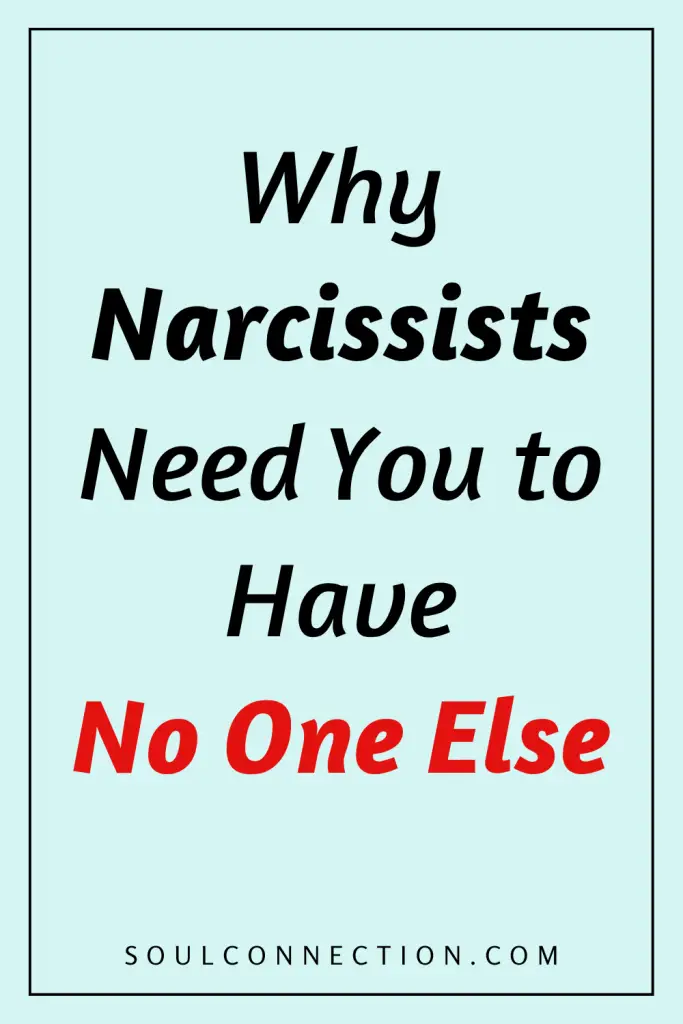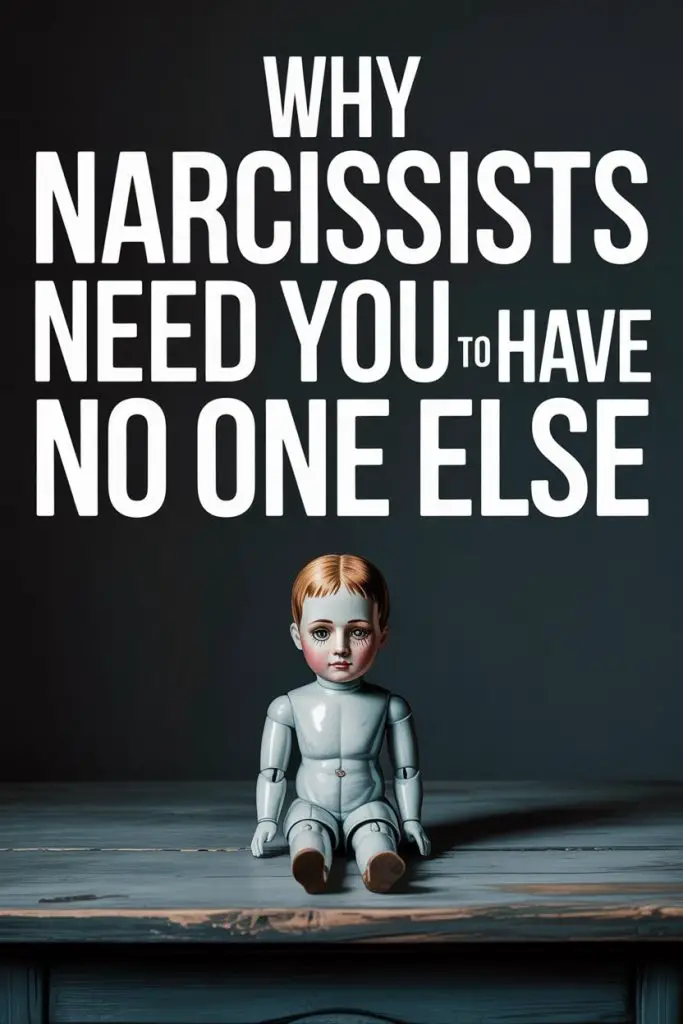Narcissists don’t just want the spotlight—they demand the whole stage, the orchestra pit, and the keys to the exit doors.
If you’ve tangled with a narcissist, you probably know how quickly your world can shrink, leaving you with nobody but them and their endless opinions about your hair, your job, and the way you chew spaghetti.
Ever wonder why narcissists are so determined to be the only person in your universe? It’s not just ego; there’s a method to their madness. Let’s pull back the curtain on this charming little circus and see what’s really going on.
The Monopoly on Attention
Narcissists crave attention the way toddlers crave sugar: endlessly, loudly, and with a slight risk of tantrums. For them, attention isn’t about mutual connection—it’s about all eyes (and ears) on them at all times.
Anyone else in your life is competition. A best friend, a sibling, your favorite barista—these people siphon off energy and care the narcissist feels is their birthright.
If you’re chatting with a mate about your workday, that’s time you’re not spending marvelling at their intellect or fluffing their already Olympic-level ego.
Jealousy isn’t an ugly accident for the narcissist. It’s a driving force wrapped in a designer coat. If they can keep you isolated, they don’t have to share the limelight or, heaven forbid, listen to someone else’s opinion about what’s best for you.
Control Is the Name of Their Game
Narcissists like their relationships the way they like their morning coffee: completely under their control (and probably a little bitter). The fewer people in your support network, the easier you are to manage.
Keeping you separated from friends and family means every idea you hear comes straight from the narcissist’s mouth.
No pesky sister suggesting you deserve better, no group chat gently nudging you to take a break, no mate dragging you off to karaoke and reminding you that life can be fun.
When you’re surrounded by loving, opinionated humans, you become harder to gaslight. You ask questions. You push back. That’s a nightmare for someone who wants you pliable and grateful for their every crumb of affection.
Your Self-Esteem Is Easier to Erode Alone
Think of self-esteem as a team sport. A healthy squad—friends, family, mentors—keeps you grounded and reminds you of your worth.
Narcissists know that if you’re buoyed by support and validation from others, you’ll start noticing their subtle digs and outright criticisms.
Isolating you makes negative comments and manipulative tactics land harder. If you feel like you have nowhere to turn, you’re more likely to swallow the idea that you’re “too sensitive” or “lucky to have them.”
It’s much easier to question your own sanity when nobody’s around to say, “Hang on, that’s not right.”
Dependency Breeds Loyalty (Or So They Think)
Narcissists want unwavering loyalty, but not the mutual, warm kind you find in a healthy partnership. They want a loyalty born of necessity—a sense that you need them, because you have no one else.
If your only source of emotional validation is the narcissist, their approval feels like oxygen. Withdraw it, and you’ll gasp for air, desperate to get back in their good graces.
Friends and family act as backup generators, keeping your emotional lights on when the narcissist decides to flick the switch.
Remove those backups, and the narcissist believes you’ll stick around, even when their behavior veers into emotional black hole territory.
Isolation Makes Their Reality Your Reality
A narcissist’s greatest trick is making their version of events feel like the only truth in the room. When you have other people in your corner, you can compare notes, laugh off the absurdities, or get a reality check when things get weird.
Take away those outside perspectives, and suddenly, the narcissist’s interpretation—no matter how warped—becomes your only reference point.
If they say you’re overreacting, well, who’s left to tell you otherwise? If they claim everyone else is out to get you, you might just start believing it.
This is gaslighting’s ideal habitat: dark, isolated, and filled with echoes of the narcissist’s voice.
The Fear of Losing Control
Narcissists are motivated by fear—a fear of being abandoned, exposed, or outshone. If you maintain close relationships with others, you’re always a flight risk: a person who might one day wise up and leave for greener (and less emotionally exhausting) pastures.
Every friend you keep, every weekend visit to Mum, every WhatsApp conversation with your old uni buddy feels like a threat to their fragile hold on you.
The solution? Convince you, subtly or otherwise, that nobody else really cares, everyone else is unreliable, and only they have your best interests at heart.
Over time, you might even start to believe it.
Sabotage in Disguise
The tactics narcissists use to isolate you rarely look like outright villainy. Sure, they might occasionally throw a tantrum if you want to spend a night out, but more often, it’s the slow drip of subtle sabotage.
Maybe they “forget” to mention a family gathering until it’s too late. Maybe they make negative comments about your friends (“Are you sure she’s not jealous of you?”) or cast doubts about your family (“They never understood you like I do”).
Maybe they suddenly need you for emotional emergencies whenever you make plans without them.
It’s not always a dramatic showdown. Sometimes it’s just death by a thousand paper cuts—each one slicing away at your other relationships until, one day, you realize you’re the last one standing in their cheerleading section.
What You Can Do Tonight
If you’re reading this and thinking, “This is my life,” it’s time for a bit of gentle rebellion. Narcissistic isolation is powerful—but not invincible.
Shoot a text to a friend you haven’t seen in ages. Schedule that coffee with your sibling. Rejoin the group chat, even if it’s mostly cat memes and inside jokes you’ve missed. Start rebuilding your social net, one thread at a time.
If your partner balks at your attempts to reconnect with others, take note. That discomfort probably isn’t about protecting you—it’s about them losing their grip.
You don’t have to stage a dramatic escape (although, if you fancy yourself the star of your own rom-com, you have my blessing).
Sometimes, the first step is simply remembering that you are allowed—no, entitled—to a life outside your relationship.
The Truth About Your Worth
Narcissists like to pretend you can’t survive without them, but here’s the plot twist: they’re the ones who can’t stand the idea of you thriving without their input.
Keeping you isolated is about feeding their own sense of importance, not about love, care, or partnership. Your connections to others are a threat only to those who want to control you—not to those who truly care for your happiness.
Reclaim your friendships, cherish your family, and nurture every relationship that makes you feel more like yourself.
In the end, the strongest antidote to narcissistic isolation is a life that’s full, rich, and shared with people who see your worth—even when you have spinach stuck in your teeth.
Rebuilding Is Worth the Effort
Escaping a narcissist’s isolating tactics isn’t easy, but it’s absolutely possible. Remember, the person you were before this relationship is still in there.
Your friends are still your friends, even if some time has passed. Your family still wants to hear your latest disaster story (they’ll love this one, trust me).
Get back in touch with the people who remind you of who you are outside the narcissist’s orbit. They’ll help you find your way, one bad pun and group selfie at a time.
You’re not alone. You never were. And anyone who needs you to be alone to keep you close? They’re not offering love—they’re offering control.
That’s one offer you can absolutely refuse.


